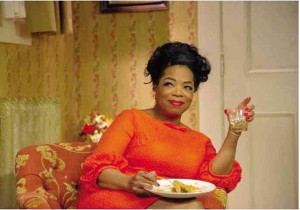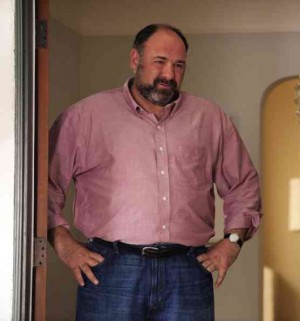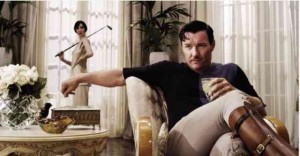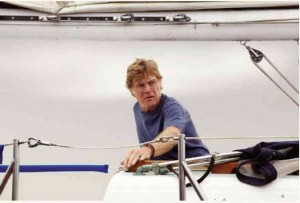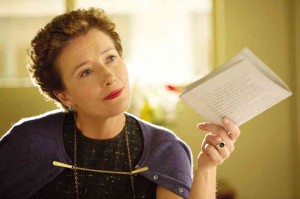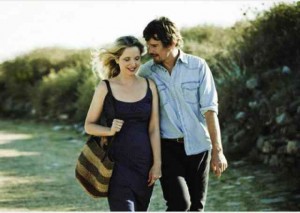Oscars: The shoo-ins & the snubbed
Monday is another day for the movie-obsessed to sit through four hours of roller-coaster emotions. It is the 86th Academy of Motion Picture Arts and Sciences Awards, aka the Oscars (official name: Academy Award of Merit).
At the Oscars in 1982, host Johnny Carson announced: “This is the night that Hollywood puts aside its petty jealousies and brings out its major jealousies.”
The object of desire of this all-night bitch-queen competition is a glorified tableware: a 13 1/2-inch-tall, 8 1/2-pound statuette of britannium (white pewterlike alloy of tin, copper and antimony) plated with copper, nickel, silver and finally 24-karat gold, on a base of black marble. Basic value: a little over $300.
Last year is said to be a very strong year for movies (a lot of worthies); it was also a strong year for Oscar baits (trite movies out to grab the Academy’s attention).
Nominated for Best Motion Picture this year are “American Hustle,” directed by David O. Russell; “Captain Phillips,” by Paul Greengrass; “Dallas Buyers Club,” by Jean-Marc Vallée; “Gravity,” by Alfonso Cuarón; “Her,” by Spike Jonze; “Nebraska,” by Alexander Payne; “Philomena,” by Stephen Frears; “12 Years a Slave,” by Steve McQueen; “The Wolf of Wall Street,” by Martin Scorsese.
Article continues after this advertisementThe big themes are scam and racism, family and the love of money. Many are ensemble productions, gathering an embarrassment of stars even in nondescript movies.
Article continues after this advertisementIt was also a strong year for actors. Steve Coogan turns dramatic in “Philomena.” So does Will Forte in “Nebraska.”
Even Dwayne Johnson, after an enjoyable romp in “Tooth Fairy,” turns poignant in “Snitch,” then blends the comic and the tragic in “Pain & Gain,” proving once and for all that he’s a competent actor.
Ethan Hawke conveys a world-weariness that comes with maturity in “Before Midnight” (the closure to Richard Linklater’s romantic trilogy with Eric Rohmer flourishes, which plays like a documentary on marital squabble).
Robert Redford, not always taken seriously as an actor, turns magisterial in “All Is Lost.”
Supporting Actress
For Best Supporting Actress, Lupita Nyong’o gets the most sympathy as a much-abused slave in “12 Years a Slave” (and she is already being considered for modeling stints). But to us her performance is just one of those.
Julia Roberts, as a long-suffering daughter of an abusive mother in “August: Osage County,” should have been nominated for Best Actress; win or lose won’t matter.
Jennifer Lawrence, as the garrulous and frenzied wife of a con man in “American Hustle,” is the only dumb blonde we’ve encountered who’s not likable (we love Harlow). She’s irritating yet touching, which only shows the effectiveness of her performance. In other words, she’s antipatika, but she gets our vote.
Snubbed: Julianne Nicholson and Juliette Lewis in “August: Osage County”; Oprah Winfrey in “Lee Daniels’ The Butler.”
Supporting Actor
For Best Supporting Actor, Michael Fassbender, as a ruthless slave-owner in “12 Years a Slave,” is effective as ever, but the one-dimensionality of his role is just unfortunate.
Jonah Hill, as the assistant manager of a fraudulent brokerage company in “The Wolf of Wall Street,” outstrips everyone in sight. He steals every scene he’s in; sometimes he starts to look like Rebel Wilson, and his bad behavior climaxes in a crowd scene that has to be seen to be believed. All in all, he is annoying (though that doesn’t detract from his thespic accomplishment).
Bradley Cooper, as a federal agent who recruits con artists to nab politicians in “American Hustle,” elicits both sympathy and repugnance, which goes to show the amount of complexity he invests in the role—but it’s not his time. (This guy’s becoming a heavy in the acting department.)
Jared Leto, as a drug-addicted transvestite afflicted with AIDS in “Dallas Buyers Club,” is a bundle of delicacy and mirth. The variations of color and tone in his performance are precise. Always a reliable actor, Leto seems a favorite with audiences and award-giving bodies this year, so he may get that statuette.
Barkhad Abdi, as a Somali pirate in “Captain Phillips,” has a languorous but fatal stare. He’s not a professional actor, but his performance is as riveting as a cobra’s. He gets our vote, and we hope Hollywood doesn’t swallow him up and diminish the naturalness of that technique.
Snubbed: Tim Blake Nelson and Logan Marshall-Green in “As I Lay Dying”; James Franco in “Spring Breakers”; Paul Dano in “Prisoners”; Daniel Brühl in “Rush”; Joel Edgerton in “The Great Gatsby” (2013).
Best Actress
For Best Actress, Sandra Bullock, as a medical engineer stranded in outer space in “Gravity,” renders a very physical performance. It was reportedly a grueling, even dangerous, shoot (but if that’s the basis of merit of an actor’s performance, no one is as beaten-up as Mark Wahlberg in “Lone Survivor”). For most of the movie, Bullock performs as if in zero gravity—less the work of an actress and more of an acrobat.
Amy Adams, as the mistress and accomplice of a con man in “American Hustle,” displays the full range of her technique with nuance and resonance. This actress can go light and amiable (“Leap Year”), or dark and edgy (“The Fighter”), but most of the time she’s a quiet presence that belies a ferocious inner strength (“The Master”), a skill that’s often overlooked by Academy voters.
Meryl Streep, as a drug-addled harridan dying of cancer in John Wells’ “August: Osage County,” tears into the role with terrifying intensity. In other words, she acts up a storm.
Every time Streep has a movie, it has become a foregone conclusion that she’d be nominated.
Here she’s a frightening presence in every scene she’s in, as the air crackles with menace and hysteria and finally explodes in a set piece that evokes the scandalous party scenes of Dostoyevsky.
Cate Blanchett, as a fallen socialite living in lies and illusions and inching to the brink of madness in “Blue Jasmine,” renders an aching performance that contrasts with Streep’s à la grecque acting.
The film plays like Woody Allen’s reworking of “A Streetcar Named Desire.” As Blanchett had done the play a few years earlier, it was inevitable that she’d carry her theater role over to this film.
In that acclaimed stage performance, she has been described as “always on the verge of falling apart, yet she keeps summoning the strength to wrestle with a world that insists on pushing her away.” That’s precisely what she does in her carefully modulated performance in this film.
She seems to be in a constant state of siege; our heart goes out to her. No harridan can upstage Blanche DuBois, ever.
Snubbed: Emma Thompson in “Saving Mr. Banks”; Julie Delpy in “Before Midnight.”
Delpy, especially, delivers a sustained performance in a 25-minute hotel-room spat with Hawke which plays like footage from a home video.
Best Actor
For Best Actor, Leonardo DiCaprio, as the king of brokerage scam in “The Wolf of Wall Street,” is much too loud, hyperkinetic, which makes him cartoonish. He can win the award this year, though, for it being long overdue in his case.
Bruce Dern, as an aging alcoholic on a road trip, limns his role with subtle shadings, which won him the award at Cannes last year. But such restraint is usually lost on Hollywood.
From the trim and debonair boyfriend in “Hush… Hush, Sweet Charlotte” and the athletic Tom Buchanan in Jack Clayton’s “The Great Gatsby” (1974), it’s quite a jolt to see this Elia Kazan-trained actor now a physical ruin in this movie. (See also in “All Is Lost” the devastation time has wrought on Redford, the golden boy of Hollywood who played the mysterious Gatsby in that 1974 movie.)
Matthew McConaughey, as an AIDS-infected man smuggling and selling prohibited drugs to AIDS patients in “Dallas Buyers Club,” gives a fierce performance that may yet get him the statuette.
After numerous heartthrob roles following his breakout performance in “Dazed and Confused,” McConaughey has gotten darker and edgier in “Bernie,” “Killer Joe,” “Mud,” and even with a brief appearance in “The Wolf of Wall Street.” With this movie, he is joining the majors.
Snubbed: Redford in “All Is Lost”; Hawke in “Before Midnight”; Joaquin Phoenix in “Her”; James Gandolfini in “Enough Said”; Oscar Isaac in “Inside Llewyn Davis.”
Some say Tom Hanks has been snubbed for his eponymous role in “Captain Phillips,” but we’d rather have him nominated for his controlled yet moving performance as Walt Disney in “Saving Mr. Banks.”
Best Picture
Possibly for exceeding the list of nominees, some worthies for Best Picture have been excluded: Joel and Ethan Coen’s “Inside Llewyn Davis”; Denis Villeneuve’s “Prisoners”; John Lee Hancock’s “Saving Mr. Banks”; “Lee Daniels’ The Butler”; Ryan Coogler’s “Fruitvale Station”; Peter Berg’s “Lone Survivor”; Ron Howard’s “Rush”; Wong Kar-wai’s “The Grandmaster.”
Most of last year’s big movies were inspired by true events. Many are inspirational movies, therefore formulaic, with little of the complexity and randomness of life.
Truffaut identifies this as cinema’s mission to deceive— “that there exists, in the very idea of cinematic spectacle, a promise of pleasure, an idea of exaltation that runs counter to the downward spiral of life that goes through infirmity and old age to death.”
“Nebraska,” about an old man who undertakes an odyssey with his estranged son across the Midwest to claim what he thinks to be a sweepstakes win and instead finds his roots, typifies this kind of cinematic spectacle.
The lucent cinematography recalls black-and-white gems from the Hollywood Renaissance (“Paper Moon” and “The Last Picture Show”). But the concluding sequence feels false, as the film backs down from the face of old age (so unlike last year’s “Amour”).
“Gravity” is a disaster movie set in outer space, a pure space-adventure yarn with touches of Kubrick and Tarkovsky.
For this two-actor, 90-minute movie, the filmmaker reportedly invented the technology and developed a groundbreaking system of LED panels, computer-controlled cameras and complicated wirework to simulate zero-gravity conditions, for three months of shooting.
What you get is as real as you could get. The special effects are frankly astonishing, based on the realism of visuals and premise. This cinematic hyper-realism we haven’t seen since, maybe, “Jurassic Park” in 1993. But there’s the inspirational tone at the end: the triumph of the human spirit (which is OK if you love clichés).
For all their remarkable features, what we find most notable are the scale and ensemble performances of “The Wolf of Wall Street” and “Dallas Buyers Club”; the thrills of “Captain Phillips”; and the musical scoring of “Philomena.”
“12 Years a Slave,” about a black freeman kidnapped and sold into slavery in pre-Civil War America, is a potent film likely to win the award. Despite its being a true story, to us it is curiously non-involving, probably because of its sentimentality and formulaic take on characters.
These people are not complex enough—that is, they’re too black-and-white. The blacks are saintly, and if there are good whites (the characters of Benedict Cumberbatch and Brad Pitt), they’re token.
As a study of racism, “Fruitvale Station” is more gut-wrenching, “The Butler” more involving, biographical inaccuracies and historical signposting notwithstanding. (These two got no nomination whatsoever.)
The exaltation at its finale feels forced beside the world-weary denouement of “The Butler.” A similar finale in Brian Percival’s “The Book Thief” is leavened with that perfect epilogue of a panning shot and a voiceover telling the rest of the story.
“Her” is a love story about loneliness and aloneness set in the near future. We’ve encountered this sad romance and erotic shenanigan in Vonnegut and Nicholson Baker before, but Jonze makes it fresh with his treatment. The strange disturbing story is handled with a straight face, not as satire, and instead of a grim dystopia of ashen visuals or antiseptic sets, we’re given Day-Glo colors.
Here Phoenix, as the lovelorn protagonist, sheds his threatening persona and puts on an aura of vulnerability. Watch the complexity of emotions he registers on his face when he realizes he’s not the only man in his girlfriend’s virtual reality. This feels like a French intimist film, but Hollywood wants grand scale, big themes and superstars. We love this one, but it won’t win.
For that we’d pick “American Hustle,” about an FBI operative joining forces with con artists to put a sting on politicians in what is now known as Abscam. This has the scale, the big theme and the ensemble of stars, so it’s a lock.
Best Director
As last year was a strong year for movies, it follows it was also a strong year for directors. Dustin Hoffman did a remarkable directorial debut with “Quartet.” Even Michael Bay turned up with what may be his best movie, “Pain & Gain.”
James Franco, already acknowledged as an accomplished actor, showed he can be a competent director as well in “As I Lay Dying.” If some critics aren’t convinced, they should at least salute the man’s courage, for making an accessible film version of Faulkner’s hitherto un-filmable novel.
To us, Cuarón’s task in “Gravity” is the most artful. He has created a whole new world, and his movie is the closest we can get to the beginnings of cinema.
Animated Feature Film
For Best Animated Feature Film, our hands are up, Chris Buck and Jennifer Lee’s “Frozen” is it. This is another Disney bowdlerization of a sinister Andersen tale (“The Snow Queen”), therefore candy-coated. But the rescuer of the damsel in distress here is another damsel (aided by a mini snowman), and Prince Charming is a scalawag—who can resist?
The cartoon, espousing true love and the value of sisterhood, has become a sociological phenomenon and attracted a cult following among both children and adults. The opening sequence alone is a winner, and with all that global chilling, it can win even over Hayao Miyazaki’s “The Wind Rises.”
Foreign Language Film
For Best Foreign Language Film, Thomas Vinterberg’s “The Hunt” tells the story of a schoolteacher accused of child molestation and ostracized by the community. Though he is finally found innocent, the stigma remains. It’s a simple story powerfully told, in what may be Vinterberg’s finest film since the explosive “The Celebration” (still our favorite).
But what truly overwhelms is Paolo Sorrentino’s resonant fugue of a movie, “The Great Beauty.” This ethereal film is Sorrentino’s valedictory to Rome and homage to Fellini, particularly “La Dolce Vita”; it even has a dwarf (the magazine editor Dadina).
When a black-clad icon of French cinema mysteriously appears one night on the Spanish Steps, it conjures the final scene of “Roma,” when there appears on a Roman street a black-clad icon of Italian cinema.
The film is replete with bons mots and debaucheries, hedonism and vulgarism that would make Petronius squeal. Visually rich, elegantly scored, it doesn’t blink from the ugly face of the Eternal City.
Not nominated yet strong on the radar: “Blue Is the Warmest Color,” by Abdellatif Kechiche, last year’s Palme d’Or winner.
As cinema art, the Best Foreign Language Film is almost always better than the Best Picture. But in the history of the Oscars, Hollywood protectionism is so strong the imports have little chance of winning the biggest award, unless they’re British.
If ever foreign films win or get nominated, it’s only for technical awards such as costume or production design, like “The Grandmaster” this year, “I Am Love” in 2011—and we can go even farther to Pasolini’s “The Gospel According to St. Matthew” in the 1960s. If they win a major award at all, it’s mostly the goody-goody ones like “Life Is Beautiful.”
On the other hand, our local filmmakers are saying they can hardly get their entries short-listed because it needs intensive lobbying in Hollywood and a lot of money for the campaign, which we don’t have.
And yet this year Cambodia’s “The Missing Picture” and Palestine’s “Omar” get nominated. So who was funding the campaign of Cambodia? Who was lobbying for Palestine, which is not even a nation and therefore has no national cinema?
In 1972, Dustin Hoffman sounded like a sourpuss. He lost twice for Best Actor the previous years, was nominated and lost again that year, then won the following year, and won again a few years later. At that time, he was quoted as describing the Oscar ceremonies as “an obscene evening, garish and embarrassing.”
Pray it ain’t so tomorrow or we’d get a barrage of OMGs and WTFs.

